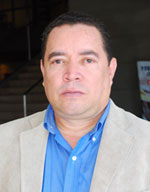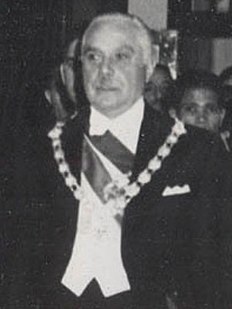
The Mirabal sisters were four sisters in the Dominican Republic, known commonly as Patria, Minerva, Maria Teresa, and Dedé, who opposed the dictatorship of Rafael Trujillo and were involved in clandestine activities against his regime. Three of the four sisters were assassinated on 25 November 1960. The last sister, Dedé, died of natural causes on 1 February 2014.
José Francisco Peña Gómez was a politician from the Dominican Republic. He was the leader of the Dominican Revolutionary Party (PRD), a three-time candidate for president of the Dominican Republic and former Mayor of Santo Domingo. He is considered, along with Joaquín Balaguer and Juan Bosch, as one of the most prominent Dominican political figures of the 20th century. His widow Peggy Cabral is currently one of the two co-Presidents of the PRD.

Col. Francisco Alberto Caamaño Deñó was a Dominican soldier and politician who took the constitutional presidency of the Dominican Republic during the Civil War of 1965. He was the son of General Fausto Caamaño Medina; his father was cousin of Juan Pablo Medina de los Santos, the father of both President Danilo Medina Sánchez and House Speaker Lucía Medina Sánchez.
See also Universidad Santo Tomás de Aquino
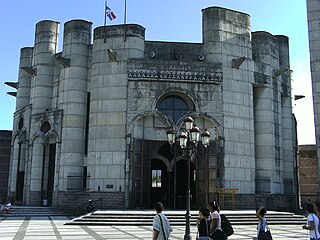
La Vega, or Concepción de La Vega is the third largest city and municipality of the Dominican Republic. It is in La Vega Province. The city is known as the heart of the Dominican Republic for its geographical position and its large agricultural production methods throughout its province.
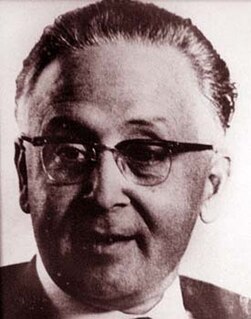
Rafael Filiberto Bonnelly Fondeur was a lawyer, scholar, diplomat, and, from 1962 until 1963, the President of the Dominican Republic, before he was president, he was vice president of the country from 1960 to 1962.

Major General Antonio Cosme Imbert Barrera was a two-star army general advitam of the Dominican Army and was President of the Dominican Republic from May to August 1965.

Joseph Donald Reid Cabral was a Dominican politician and lawyer. Reid became president during the "triumvirate" from December 28, 1963 to April 25, 1965.
Dominican Republic literature has a long and interesting history.

The Dominican Civil War took place between April 24, 1965, and September 3, 1965, in Santo Domingo, Dominican Republic. It started when civilian and military supporters of former President Juan Bosch overthrew acting President Donald Reid Cabral. The coup prompted General Elías Wessin y Wessin to organize elements of the military loyal to President Reid ("loyalists"), initiating an armed campaign against the so-called constitutionalist rebels. Allegations of foreign support for the rebels led to a United States intervention in the conflict, which later transformed into an Organization of American States occupation of the country. Elections were held in 1966, in the aftermath of which Joaquín Balaguer was elected into the presidential seat. Later in the same year international troops departed from the country.
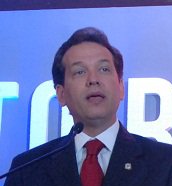
Víctor Orlando Bisonó Haza nicknamed Ito Bisonó, is a Dominican politician, business administration and current member of the Chamber of Deputies of the Dominican Republic representing the 2nd circunscription of the National District since the year 2002. Bisonó is a member of the Social Christian Reformist Party, and he has been Second Vice President of the Dominican-Haitian Chamber of Commerce.
Miguel D. Mena. Poet, essayist and publisher. He studied sociology in the Autonomous University of Santo Domingo where he graduated in 1986 with the thesis Ciudad, espacio y poder en Republica Dominicanca. He continued his research on the city of Santo Domingo in Germany where he has been living since 1990. His Phd from the Free University of Berlin has been recently published under the title: Iglesia, Espacio y Poder: Santo Domingo (1498–1521) Experiencia Fundacional del Nuevo Mundo. He has also written a collections of essays about the urban cuestion in the Dominican Republic and hundred of articles for newspapers and magazines about contemporary aspects of the Dominican capital. He has also written extensively about Dominican literature and especially about Vanguardism in the Dominican literature. He has been one of the leading figures in independent publishing since the mid eighties in Dominican Republic. He is now at the head of “Cielonaranja Ediciones”
White Dominicans are Dominicans of complete or predominant European descent. They represent 16.1% of the Dominican Republic's population, according to the last population census in which race was queried. The majority of white Dominicans are descendants from the first European settlers to arrive in Hispaniola and have ancestry of the Spanish and French who settled in the island during colonial times, as well as the Canary Islanders, Portuguese who settled in the 16th and 17th centuries. Many others also descend from white Levantines, Italians, Dutchmen, Germans, Hungarians, Americans, and other nationalities who have migrated between the 19th and 20th centuries.

Dominican Republic–Mexico relations refers to the diplomatic relations between the Dominican Republic and Mexico. Both nations have over the years joined several multilateral forums and are members of the Association of Caribbean States, Community of Latin American and Caribbean States, Organization of American States, Organization of Ibero-American States and the United Nations.

Abelardo Vicioso was a Dominican intellectual, politician, lawyer, and poet.
María de los Ángeles del Sagrado Corazón de Jesús Trujillo Martínez, known as Angelita Trujillo, is a Dominican writer. She is most known by her role as the predilect daughter of former Dominican Republic dictator' Rafael Trujillo.
